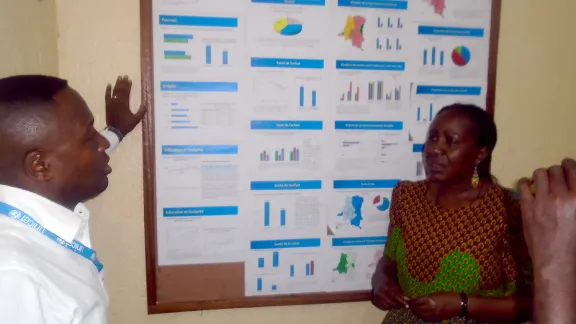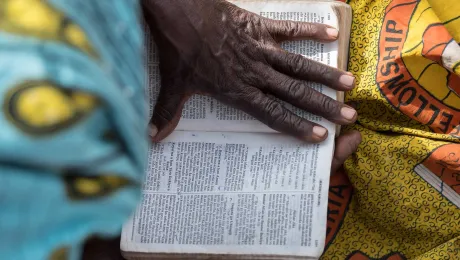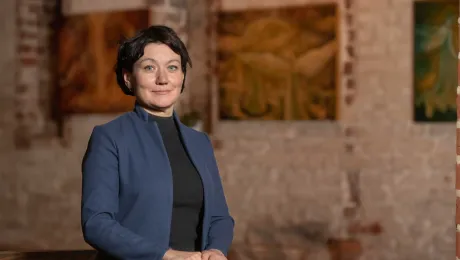
Patrick Matala head of Unicef Kananga explaining access to basic services to Anne Wangari from LWF. Photo: LWF/DRC
LWF and Evangelical Lutheran Church of Congo visit Kasai
(LWI) – In October, representatives of The Lutheran World Federation (LWF) and the Evangelical Lutheran Church of Congo (EELCO) undertook a solidarity visit to the conflict-affected Kasai region in the Democratic Republic of Congo (DRC). The visit was also an occasion for a needs assessment on the ground.
“The joint visit was the expression of the holistic mission of the church to express compassion to the affected people, while also assessing the humanitarian needs and possibilities for future interventions,” Clovis Mwambutsa, the LWF Country representative in the DRC said. The delegation consisted of representatives of EELCO, LWF World Service Africa emergency hub in Nairobi, and the DRC country program.
“Indescribable misery”
Conflict broke out in Kasai in August 2016, following a contested local appointment of a government chief in the central region. As a result, several militia groups who challenged the outcome were formed. This led to fighting between the militia groups and the government army, which soon spread to the entire Kasai region and the crisis took an ethnic dimensions in April 2017.
Until October 2017, more than 1.4 million people had been internally displaced while about 30,000 sought refuge in Angola, where the LWF is responding. Refugees in Angola have reported atrocities such as killings and rape.
In Kasai, the team met with the local population, displaced people, but also other organizations with whom the LWF works, such as Caritas and local partners of the ACT Alliance. They visited a village which has been affected by the fighting, and met internally displaced people (IDPs) from neighboring towns.
“The crisis has caused indescribable misery,” Rev. Ayumba de Sangwa from the EELCO said. “I was especially moved by the people who are spending their nights outside, because their houses have been burnt, sometimes without food or medical attention, although there are seasonal rains now.”
“They share what they have”
“Their houses have been burnt, they do not have enough to eat themselves, still the people that were hosting people have supported displaced family members and friends and share the little food they have with IDPs,” Anne Wangari, leader of the LWF emergency hub in Nairobi observed.
The conversations revealed the full extent of the crisis: Burned villages, destroyed schools and health posts. There is neither clean water nor health care. Sexual violence such as rape and early marriage are common. Access is difficult, as “the roads are very bad or non-existent”, Wangari said. “There is no clean drinking water. Students learn under the trees and without proper clothing,” de Sangwa added.
Children especially vulnerable
Most at risk are the children, who have been traumatized by losing parents and witnessing violence. One of the most appalling things the LWF delegation heard about was the abuse of children as child soldiers by militia groups.
“Some children were used to commit atrocities like the murder of family members and neighbors,” Wangari said. “They are viewed by the population as a dormant threat that could explode anytime.” Psychosocial support and access to education are needed to help them find their way back into the communities.
In the areas we visited, there has been no food aid since the fighting started. The people who fled here eat what they can get from their neighbors and relatives who have taken them in, but it is not enough.
The most pressing issue however is access to food, Mwambutsa said. “In the areas we visited, there has been no food aid since the fighting started. The people who fled here eat what they can get from their neighbors and relatives who have taken them in, but it is not enough.”
More than material support
The local churches are practically absent in the psychological and moral care for the victims and the former militia. I think that not only material care is needed, but also moral support.
Pastor de Sangwa believes that the local church could play a role in providing psychosocial support to the affected population: “The local churches are practically absent in the psychological and moral care for the victims and the former militia. I think that not only material care is needed, but also moral support.”
Together with the local church and partner organizations in the ACT Alliance, LWF is exploring how to support the people in need.
Please support our work in the DRC and Angola.


